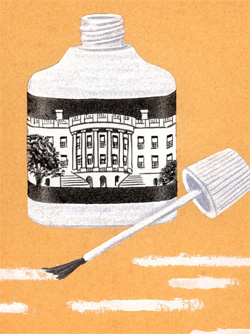Michael Lewis' excellent article, "Obama's Way," about the Obama White House in the October issue of Vanity Fair raises some interesting questions about sourcing in political journalism. By allowing the White House to approve quotations--which he has admitted--he surrendered some of his independence as a journalist in exchange for access.
As the New York Times' Jeremy W. Peters writes:
[The White House] press office has veto power over what statements can be quoted and attributed by name... Most reporters, desperate to pick the brains of the president's top strategists, grudgingly agree. After the interviews, they review their notes, check their tape recorders and send in the juiciest sound bites for review... Now, with a millisecond Twitter news cycle and an unforgiving, gaffe-obsessed media culture, politicians and their advisers are routinely demanding that reporters allow them final editing power over any published quotations.

To be sure, we all want to be quoted accurately, but that is very different from allowing sources to delete substantive remarks. We should be concerned about that practice in a democracy, and we should expect reporters to resist that kind of control. Censorship and news control are exactly that, whether the media is complicit or not, and such a cozy relationship between media and public officials or political campaigns is not in the interest of a free press or an open society.
Nor is quoting anonymous "senior government officials" or "senior campaign officials," which is another ethical issue Lewis' Vanity Fair article raises. Was it necessary for him to hide the identity of those commenting on the president's behavior in a March 15, 2011 meeting on Libya with such descriptions as "one of the participants at the meeting," "says one participant," and "recalls one eyewitness"? After all, what Lewis is describing is not top security information or the president's particular views, but human responses to the president's behavior. Lewis has already identified the "principals" attending the meeting. Surely, who is saying what among senior advisers and their top assistants about how Obama functions at a meeting on a major issue would be interesting.
In citing unidentified sources and letting the White House edit his quotations, the Lewis article reminds us that anonymous sources often provide information because of self-interest. Anonymous sourcing opens the gates for the reporter and editor to find someone who agrees with their own opinions. Often reporters and officials use one another in a complicit relationship where truth takes a backseat to convenience- officials get their views out, reporters get a scoop. This practice has a long history, dating back to a time when major news columnists, most newspapers, TV networks and the administration had a less adversarial relationship. Thus American presidents used major newspaper columnists like James Reston, Arthur Krock, Walter Lippmann and the Alsops to release important information, and these columnists did not necessarily attribute their source to the president.
Often there is no reason not to identify a source and if he or she insists on anonymity, the story should be written without quotations. An exception can be made if attribution would put someone's life in danger--and, in addition, whistle-blowers and national security need to be protected--but the media should be careful not to provide too large an umbrella. I need not remind New York Times readers that this is how Judith Miller, who claimed access to high-level sources, reported on the existence of WMDs in Iraq, a story that had no foundation in fact.
As the third Public Editor of the Times, Clark Hoyt, told me:
I think there have been... notable occasions when the Times has been less than properly skeptical of official government information, and the most famous, relatively recent example is the war in Iraq... You always have to fear that there is a degree of [a reporter's] self-correction [that] goes on out of fear of compromising that access in some way.
Indeed, Bill Keller wrote in a June 23, 2005 memo that the use of anonymous sources "is not routine but an exception," and that reporters need to know "how the sources know what they know, what motivated them to share information, and why they are entitled to anonymity." And of course the same standard should apply to submitting quotes for review. The reporter should also make clear when he is skeptical about the reason for editing quotations if he agrees to this procedure at all.
Put baldly, those sources who do not want to speak for attribution and/ or edit their own quotations often speak for their own purposes and deliberately try to mislead the media. As Lord Northcliffe, owner of the London Times and Daily Mail once remarked, "News is what someone, somewhere is trying to suppress. The rest is advertising," and these anonymous sources and those who want to take back what they said are usually simply advertising their point of view, often out of self-interest. Without sources hiding behind vague titles and taking back what they said, we would have less advertising and more informative and truthful news.
Author of the recently published Endtimes? Crises and Turmoil at the New York Times, 1999-2009 (Excelsior Editions of SUNY Press), Daniel R. Schwarz is Frederic J. Whiton Professor of English and Stephen H. Weiss Presidential Fellow at Cornell University. He can be reached at drs6@cornell.eduand can be followed on twitter at www.twitter.com/danRSchwarz.
This story originally appeared in Huffington, in the iTunes App store.
